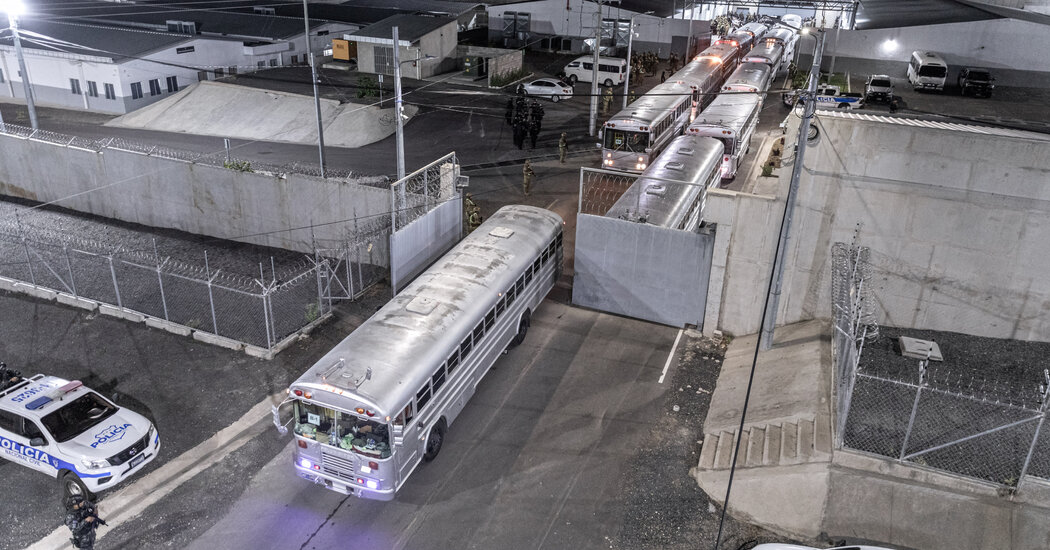Lawyers for Venezuelan migrants accused of being members of a violent street gang asked the Supreme Court on Tuesday to continue a temporary block on President Trump’s use of a wartime powers law to send hundreds of people to a prison in El Salvador.
The Trump administration has asked the justices to intervene and lift a block on the deportations imposed by a lower court. But a brief filed on behalf of the immigrants by the American Civil Liberties Union and Democracy Forward said that block is now “the only thing” preventing the Trump administration from sending immigrants “to a prison in El Salvador, perhaps never to be seen again, without any kind of procedural protection, much less judicial review.”
The government has already sent more than 130 Venezuelan men from the United States to El Salvador, according to the court filing, where the migrants “have been confined, incommunicado, in one of most brutal prisons in the world, where torture and other human rights abuses are rampant.”
The legal battle over the deportations of the Venezuelan migrants is one of the first major tests of Mr. Trump’s flurry of executive orders to reach the high court. It is perhaps the most high-profile of the eight emergency applications filed by the administration, focusing squarely on a collision between the judicial and executive branches.
There are typically no hearings or oral arguments for cases on the Supreme Court’s emergency docket, and there is no public schedule for a decision.
The 514-page filing, which included documents from the lower court and declarations from human rights experts, marks the latest turn in the legal fight over Mr. Trump’s efforts to remove immigrants accused of being members of Tren de Aragua, a street gang with roots in Venezuela’s northern Aragua state.
The Trump administration asked the Supreme Court on March 28 to to vacate a decision by Judge James E. Boasberg in the Federal District Court in Washington to temporarily pause deportations under the Alien Enemies Act of 1798, a law that gives the president sweeping authority to remove citizens of foreign countries determined to be “alien enemies” in cases of war or invasion.
In its application to the justices, lawyers for the Trump administration argued that the president was authorized to use the act to deport the Venezuelans because he had determined that thousands of gang members had “illegally ‘infiltrated’ the country” as part of a plan by the Venezuelan government to destabilize democracies.
Lawyers for the immigrants sharply disputed this, arguing that Mr. Trump was contorting the law in an “effort to shoehorn a criminal gang” into the wartime law “on a migration-equals-invasion theory,” which they argued “is completely at odds with the limited delegation of wartime authority Congress chose to give him through the statute.”
Last month, the Trump administration ordered the deportation of more than 100 people who the government argues are members of the gang. Since then, they have been denied any due process to challenge the allegations against them.
In their court filing, lawyers for the Venezuelans argued that keeping Judge Boasberg’s temporary block on the deportations would not present a risk to public safety, since the judge had not ordered anyone to be released nor prevented the government from deporting migrants under normal processes.
They cited a March 31 social media post by Secretary of State Marco Rubio stating that the U.S. military had sent another 17 people, some of whom he said were members of Tren de Aragua, to El Salvador. The Trump administration has claimed that those men had been deported under regular U.S. immigration law, not the Alien Enemies Act.
If the court were to lift the block and allow deportations to resume under the Alien Enemies Act, lawyers for the immigrants argued, the consequences could be severe. They said their clients would “suffer extraordinary and irreparable harms — being sent out of the United States to a notorious Salvadoran prison, where they will remain incommunicado, potentially for the rest of their lives, without having had any opportunity to contest their designation as gang members.”
United States Politics and Government,Deportation,Presidential Power (US),Alien Enemies Act (1798),American Civil Liberties Union,Democracy Forward (Nonprofit),Supreme Court (US),Tren de Aragua (Gang)
#Venezuelan #Migrants #Supreme #Court #Block #Deportations
